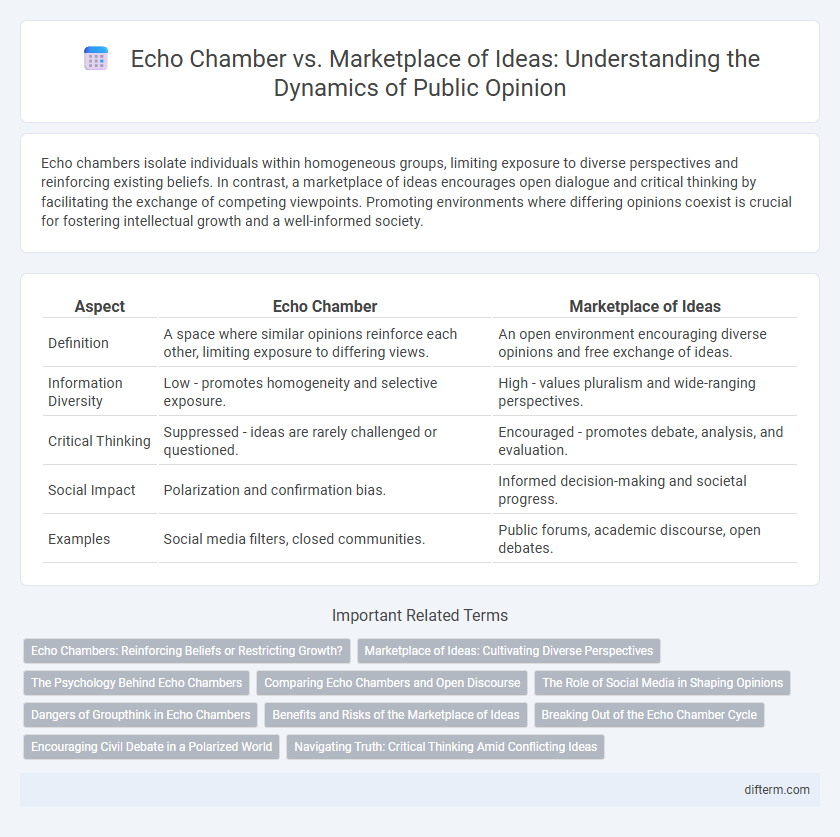Echo chambers isolate individuals within homogeneous groups, limiting exposure to diverse perspectives and reinforcing existing beliefs. In contrast, a marketplace of ideas encourages open dialogue and critical thinking by facilitating the exchange of competing viewpoints. Promoting environments where differing opinions coexist is crucial for fostering intellectual growth and a well-informed society.
Table of Comparison
| Aspect | Echo Chamber | Marketplace of Ideas |
|---|---|---|
| Definition | A space where similar opinions reinforce each other, limiting exposure to differing views. | An open environment encouraging diverse opinions and free exchange of ideas. |
| Information Diversity | Low - promotes homogeneity and selective exposure. | High - values pluralism and wide-ranging perspectives. |
| Critical Thinking | Suppressed - ideas are rarely challenged or questioned. | Encouraged - promotes debate, analysis, and evaluation. |
| Social Impact | Polarization and confirmation bias. | Informed decision-making and societal progress. |
| Examples | Social media filters, closed communities. | Public forums, academic discourse, open debates. |
Echo Chambers: Reinforcing Beliefs or Restricting Growth?
Echo chambers amplify existing beliefs by consistently exposing individuals to similar viewpoints, which limits exposure to diverse perspectives and critical thinking opportunities. This reinforcement can lead to ideological rigidity, reducing open-mindedness and intellectual growth. Such environments restrict the marketplace of ideas by narrowing the range of opinions that users encounter, ultimately hindering balanced discourse and innovation.
Marketplace of Ideas: Cultivating Diverse Perspectives
The marketplace of ideas fosters intellectual growth by encouraging the exchange of diverse perspectives, allowing individuals to critically evaluate and refine their own beliefs. Exposure to a variety of viewpoints challenges cognitive biases and promotes empathy, ultimately strengthening democratic discourse and innovation. This diversity of thought is essential for problem-solving and societal progress, contrasting sharply with the isolating nature of echo chambers that reinforce narrow worldviews.
The Psychology Behind Echo Chambers
Echo chambers reinforce preexisting beliefs through selective exposure and confirmation bias, limiting cognitive diversity and critical thinking. Psychological mechanisms such as motivated reasoning and group identity amplify resistance to opposing viewpoints, creating polarized social environments. Understanding these processes is crucial for fostering open dialogue in the marketplace of ideas and promoting intellectual humility.
Comparing Echo Chambers and Open Discourse
Echo chambers limit exposure to diverse perspectives by reinforcing existing beliefs, while open discourse in a marketplace of ideas encourages critical thinking and the exchange of contrasting viewpoints. Echo chambers often lead to polarization and misinformation, whereas open discourse fosters innovation and collective problem-solving. The marketplace of ideas relies on free expression and active engagement to challenge assumptions and promote a more informed society.
The Role of Social Media in Shaping Opinions
Social media algorithms often prioritize content that reinforces existing beliefs, fostering echo chambers that limit exposure to diverse perspectives and polarize opinions. However, these platforms also serve as marketplaces of ideas by enabling the rapid exchange of information and connecting users with varied viewpoints globally. The challenge lies in balancing algorithmic design to promote critical engagement while minimizing ideological segmentation.
Dangers of Groupthink in Echo Chambers
Echo chambers foster groupthink by reinforcing homogeneous viewpoints and stifling critical analysis, leading to intellectual complacency and biased decision-making. In these environments, dissenting opinions are often marginalized or ignored, undermining diversity of thought essential for a healthy marketplace of ideas. This dynamic increases the risk of polarization, misinformation, and erosion of democratic discourse.
Benefits and Risks of the Marketplace of Ideas
The marketplace of ideas fosters intellectual diversity by encouraging open debate and the free exchange of conflicting opinions, which can lead to more informed decision-making and societal progress. Its benefits include the potential for truth to emerge through rigorous discussion and the promotion of tolerance for differing viewpoints. However, the marketplace also risks amplifying misinformation and entrenched biases when false or harmful ideas gain undue influence without sufficient critical scrutiny.
Breaking Out of the Echo Chamber Cycle
Escaping echo chambers requires actively engaging with diverse viewpoints to challenge confirmation bias and promote critical thinking. Exposure to a broad spectrum of ideas strengthens the marketplace of ideas by fostering informed debate and innovation. Encouraging open dialogue across ideological divides dismantles insular information bubbles and cultivates intellectual growth.
Encouraging Civil Debate in a Polarized World
Encouraging civil debate in a polarized world demands breaking free from echo chambers that reinforce existing beliefs and hinder open dialogue. Promoting a marketplace of ideas where diverse perspectives engage respectfully fosters critical thinking and social cohesion. Structured platforms emphasizing empathy and active listening can bridge ideological divides and cultivate mutual understanding.
Navigating Truth: Critical Thinking Amid Conflicting Ideas
Navigating truth requires rigorous critical thinking to discern credible information within echo chambers where confirmation bias dominates and diverse viewpoints are often suppressed. The marketplace of ideas thrives on open dialogue and intellectual challenge, fostering a dynamic environment where competing perspectives can be evaluated and refined. Cultivating media literacy and analytical skills empowers individuals to transcend cognitive biases and engage constructively amidst conflicting ideas.
echo chamber vs marketplace of ideas Infographic

 difterm.com
difterm.com